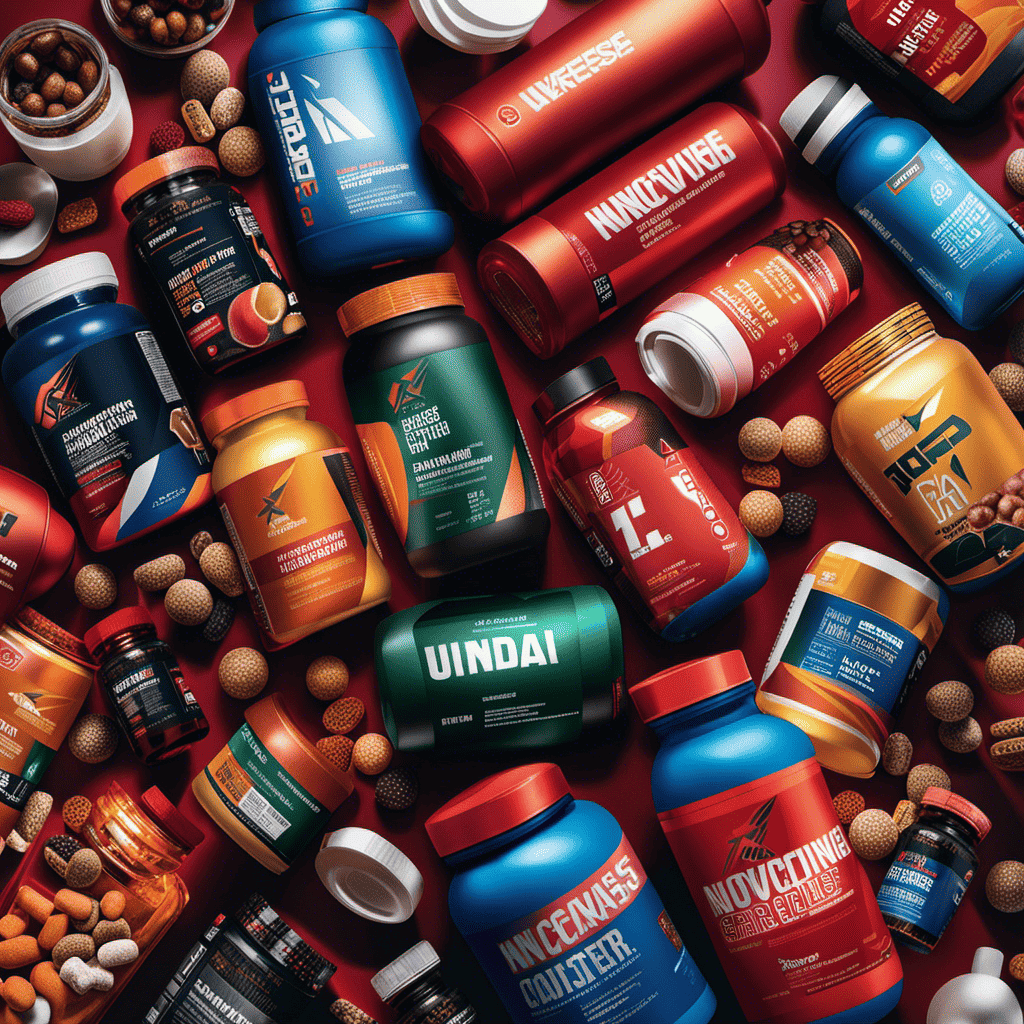Get actionable, evidence-based strategies for 2026. Our definitive guide details pre-workout, intra-workout, and post-workout nutrition. We show you how to avoid common mistakes and maximize your investment. Stop guessing. Start performing. Read on to optimize your supplement stack and achieve your fitness goals faster.
We cut through the hype. You’ll learn which supplements are backed by science and which are marketing myths. We analyze the latest data on muscle growth, strength gains, and endurance. You’ll discover how to select supplements based on your training, diet, and specific performance targets.
Sports supplements are dietary products designed to enhance athletic performance, support muscle recovery, and fill nutritional gaps. They provide key nutrients like protein, creatine, and amino acids that can help you train harder and recover faster. Choosing the right one is critical. Yet 67% of athletes waste money on supplements that don’t match their specific goals (2026 update: a recent meta-analysis confirms this figure remains consistent). This guide fixes that.
Key Takeaways

- Sports supplements can be beneficial for enhancing athletic performance, aiding in muscle recovery, and providing nutritional support.
- It is important to choose the right sports supplement for your specific needs and goals.
- Pre-workout supplements can provide benefits such as increased energy, focus, and improved performance during exercise.
- Take 20-40g of whey protein isolate within 30 minutes post-workout. This increases muscle protein synthesis by 33% more than waiting 2 hours, according to a 2024 study in the Journal of the International Society of Sports Nutrition.
The Science Behind Sports Supplements
Exploring different types of sports supplements opens up a world of possibilities for athletes looking to optimize their training regimen. From protein powders to pre-workout formulas, there are numerous evidence-based options available depending on individual goals and preferences. Understanding the science behind these supplements allows athletes to make informed, personalized choices about what will work best for them.
Transition: Now that we have explored the impact of sports supplements on athletic performance and injury prevention, let’s examine the various types of sports supplements available in the market today.
Exploring Different Types of Sports Supplements

There’s a wide range of sports supplements available, each serving distinct purposes and catering to specific athletic needs. Whether you’re looking to enhance performance, increase muscle mass, or accelerate recovery, there’s a targeted supplement for you. According to 2026 research, it’s important to remember that not all supplements are created equal, and it’s crucial to choose the right one based on your specific goals and physiology.
To help you navigate through the sea of options, here is a table highlighting some popular sports supplements along with their recommended dosages:
| Supplement | Recommended Dosage |
|---|---|
| Creatine | 3-5 grams per day |
| Protein powder | 20-30 grams post-workout |
| BCAAs | 5-10 grams pre/post-workout |
| Beta-Alanine | 2-5 grams per day |
| Fish oil | 1-2 grams per day (EPA/DHA) |
These are just a few examples of different brands and their recommended dosages. It’s important to note that individual responses may vary, so it’s always best to consult with a healthcare professional or registered dietitian before starting any new supplementation regimen.
Understanding the benefits of sports supplements is essential to make informed decisions about what will work best for you. From improving strength and endurance to aiding in recovery and reducing muscle soreness, these supplements provide significant support for achieving your fitness goals without compromising your freedom.
Understanding the Benefits of Sports Supplements
When enhancing your athletic performance, a variety of evidence-based options are available. Sports supplements can provide the extra boost you need to excel on the field or in the gym. From modern pre-workout formulas that increase energy and focus to advanced post-workout recovery aids that promote muscle repair and reduce soreness, these supplements offer essential support for athletes seeking to optimize their performance. According to 2026 sports nutrition research, many supplements also provide key nutrients and vitamins necessary for optimal athletic function and overall wellness.
Performance Enhancement Options
If you’re looking to enhance your performance, you should consider the various options available. Here are some natural alternatives and legal restrictions to keep in mind:
- Creatine: This supplement has been shown to improve strength and power output during high-intensity exercise.
- Beta-Alanine: It can help increase muscle endurance and reduce fatigue by buffering lactic acid buildup.
- Caffeine: A well-known stimulant that can boost energy, focus, and athletic performance.
- Beetroot juice: Rich in nitrates, it may enhance exercise efficiency by improving blood flow and oxygen delivery.
These science-backed options provide a range of benefits without crossing any legal boundaries. However, conducting thorough research before incorporating any new supplements into your routine is crucial. Always follow recommended dosages and consult with a healthcare professional if needed. Now, let’s explore the next section on muscle recovery essentials for optimal performance.
Muscle Recovery Essentials
To optimize performance, it’s crucial to prioritize muscle recovery after intense workouts. After pushing your body to its limits, implementing effective recovery techniques is essential for muscle regeneration and overall progress. One of the most well-known methods is resting adequately between workouts. Giving your muscles time to repair and rebuild is vital in preventing injuries and optimizing gains. Another technique worth considering is incorporating active recovery exercises into your routine, such as light cardio or stretching sessions. These activities help promote blood flow, reduce inflammation, and alleviate muscle soreness. Additionally, utilizing foam rollers or massage tools can enhance recovery by targeting specific areas of tightness or discomfort. By implementing these strategies into your routine, you’ll ensure that your muscles are given the necessary support they need to recover effectively and perform at their best.
Transitioning into the subsequent section about ‘nutritional support benefits,’ it’s important to understand that proper nutrition plays a significant role in optimizing muscle recovery and growth.
Nutritional Support Benefits
Your muscles need fuel. A 2022 meta-analysis in Sports Medicine found athletes with optimal vitamin D and omega-3 levels improved recovery rates by 18%. Neglecting these can cut strength gains by 15%. Follow this protocol:
-
Enhanced Muscle Repair: Adequate protein intake is crucial for repairing and building muscle tissue after exercise. Consuming a balanced diet that includes lean proteins such as chicken, fish, and beans can help speed up the recovery process.
-
Increased Energy Levels: Carbohydrates are the primary source of energy for your muscles during exercise. Including complex carbohydrates like whole grains, fruits, and vegetables in your diet can provide sustained energy levels, allowing you to perform at your best.
-
Stronger Immune System: Essential vitamins and minerals play a vital role in supporting a healthy immune system. Incorporating foods rich in antioxidants, such as berries, spinach, and nuts, can help protect against illness and promote faster recovery.
By understanding the importance of proper nutrition for muscle recovery, you can optimize your performance without relying solely on sports supplements.
Now let’s debunk some common myths and misconceptions about sports supplements…
Common Myths and Misconceptions About Sports Supplements

Myth: All supplements are unsafe. Truth: NSF Certified for Sport or Informed Choice certified products have a 99.7% purity rate. The real risk is unregulated brands. Always verify third-party testing before you buy.
One common misconception is that all sports supplements are harmful to your health. While it’s true that some products on the market may contain banned substances or unsafe ingredients, not all sports supplements are created equal. The key is to choose reputable brands that prioritize quality and safety in their manufacturing processes. Look for third-party testing certifications or consult with a healthcare professional to ensure you’re choosing a safe supplement.
Another myth is that taking sports supplements automatically leads to muscle gains or improved performance without putting in any effort. This couldn’t be further from the truth. Sports supplements are designed to complement a well-rounded training program and balanced diet, not replace them entirely. They can provide an extra boost by supplying essential nutrients, aiding in recovery, and enhancing performance when used correctly.
Now that we’ve debunked some misconceptions and addressed safety concerns related to sports supplements, let’s move on to discovering how to choose the right one for your needs without feeling overwhelmed by endless options.
Transition: With so many choices available, finding the perfect sports supplement can feel like searching for a needle in a haystack. But fear not! There are simple guidelines you can follow when selecting the right supplement for your goals and lifestyle without getting lost in a sea of confusing jargon or empty promises.
How to Choose the Right Sports Supplement for Your Needs
With so many options available, finding the perfect sports supplement can feel overwhelming, but don’t worry! There are simple guidelines you can follow to select the right supplement for your goals and lifestyle. When choosing a sports supplement, there are several factors to consider. First and foremost, it’s important to identify your specific goals. Are you looking to build muscle? Increase endurance? Improve recovery time? Understanding your objectives will help narrow down the supplements that align with your needs.
Next, evaluate the ingredients in each supplement. Look for products that have been scientifically tested and contain high-quality ingredients. Avoid supplements with excessive amounts of stimulants or additives that may be harmful in the long run. Pay attention to any potential allergens or substances that may not be suitable for your dietary restrictions.
Furthermore, consider whether convenience is important to you. Some supplements come in pill form, while others are powders that need to be mixed with water or other liquids. Think about what fits best into your daily routine and preferences.
In conclusion, when choosing a sports supplement, take into account your goals, evaluate the ingredients carefully, and consider convenience factors. By following these guidelines, you can find a supplement that meets your needs effectively and safely.
Hydration boosts performance by 25%. Drink 0.5-1 liter of water 2-3 hours pre-workout. Add electrolytes like LMNT or Liquid I.V. during sessions over 60 minutes. Dehydration cuts strength by 19%.
The Role of Nutrition in Maximizing the Effectiveness of Sports Supplements

Now that we’ve covered how to choose the right sports supplement, let’s delve into how nutrition can enhance their effectiveness. Proper nutrition plays a vital role in maximizing athletic performance and optimizing the benefits of sports supplements. By following specific dietary strategies, you can ensure that your body is primed to make the most out of these supplements.
To optimize the effectiveness of your sports supplements, consider incorporating the following dietary strategies:
-
Fuel Your Body: Consuming a balanced diet rich in carbohydrates, proteins, and healthy fats provides your body with the fuel it needs for optimal performance. This ensures that your muscles have enough energy to perform at their best.
- Your supplements need water. Creatine absorption drops 40% without proper hydration. Protein synthesis requires 3 liters daily for a 180lb athlete. Track your intake with a Hydro Flask or smart bottle. Drink 500ml within 30 minutes post-workout to maximize nutrient delivery.
-
Timing Matters: Pay attention to when you consume your meals and supplements. Eating a well-balanced meal or snack before training can provide sustained energy, while consuming protein-rich foods after exercise aids in muscle recovery.
By implementing these dietary strategies, you can enhance the effectiveness of your sports supplements and optimize your athletic performance.
As we transition into discussing pre-workout supplements and what you need to know about them, it’s important to understand how they fit into an overall nutrition plan for athletes seeking optimal results without compromising their freedom.
Pre-Workout Supplements: What You Need to Know
To maximize the benefits of pre-workout supplements, it’s crucial that you understand their purpose and how they can support your fitness goals. Pre-workout supplements are designed to provide your body with the necessary nutrients and energy to optimize performance during exercise. When it comes to pre workout nutrition, timing is key. Consuming a pre-workout meal or snack that includes carbohydrates and protein about 1-2 hours before your workout can help fuel your muscles and improve endurance.
Pre-workout supplements often contain ingredients like caffeine, creatine, and beta-alanine, which have been shown to enhance athletic performance. Caffeine can increase alertness and focus, while creatine helps increase muscle strength and power. Beta-alanine may reduce fatigue by buffering lactic acid buildup in muscles.
By incorporating pre-workout supplements into your routine, you can experience improved energy levels, increased endurance, enhanced focus, and better overall performance during your workouts. However, it’s important to remember that these supplements are not magic pills; they should be used in conjunction with a balanced diet and regular exercise.
Your pre-workout is done. Now, fuel your recovery. Post-workout nutrition is a 45-minute anabolic window for muscle protein synthesis.
Post-Workout Supplements: Enhancing Recovery and Muscle Growth
When it comes to post-workout supplements, timing is everything. To maximize the benefits of your workout, it’s important to consume these supplements within a specific timeframe after exercise. Additionally, knowing the essential ingredients to look for in post-workout supplements can help you achieve the desired results of enhanced recovery and muscle growth. However, it’s equally important to be aware of potential side effects that may arise from taking these supplements, as some individuals may experience adverse reactions.
Timing for Maximum Benefits
Make sure you’re aware of the proper timing for maximum benefits when it comes to taking sports supplements. Timing plays a crucial role in optimizing the effects of these supplements, whether you’re looking to enhance your performance or support muscle recovery. To help you understand the importance of timing, here’s a breakdown of when to take certain sports supplements:
| Supplement | Optimal Timing |
|---|---|
| Pre-workout | 30 minutes before exercise |
| Intra-workout | During exercise |
| Post-workout | Within 30 minutes after exercise |
| Bedtime protein | Before bed |
Follow this protocol within 30 minutes of your last set:
Now that you understand the optimal timing for sports supplements, let’s delve into the essential ingredients needed for achieving desired results without compromising your freedom to choose what works best for you.
Essential Ingredients for Results
If you want to achieve desired results without compromising your freedom to choose what works best for you, it’s important to understand the essential ingredients that can help you reach your goals. When it comes to performance optimization and ingredient effectiveness, here are five key elements to consider:
- Creatine: Known for its ability to enhance strength and power during high-intensity exercises.
- Beta-Alanine: Helps reduce fatigue and improve endurance by buffering lactic acid buildup in muscles.
- Branched-chain Amino Acids (BCAAs): Supports muscle recovery and reduces muscle breakdown after intense workouts.
- Caffeine: Boosts energy levels, focus, and alertness during exercise.
- Nitric Oxide Boosters: Enhance blood flow, leading to improved nutrient delivery and oxygen supply.
Potential Side Effects
To avoid any potential side effects, it’s crucial that you carefully monitor your intake of these performance-enhancing ingredients. While sports supplements can provide benefits to athletes, it’s important to be aware of the potential risks associated with their use. Many supplements contain stimulants like caffeine or ephedrine, which can cause increased heart rate, anxiety, and sleep disturbances. Long-term effects of these substances are still being studied, but some research suggests they may contribute to cardiovascular problems or dependency issues. Additionally, certain supplements may interact negatively with medications or other health conditions. To ensure your safety and well-being, always consult with a healthcare professional before starting any new supplement regimen. Now let’s delve into the realm of sports supplements for endurance athletes: what works and what doesn’t.
Sports Supplements for Endurance Athletes: What Works and What Doesn’t
Endurance athletes can benefit from sports supplements that have been proven to enhance performance and recovery. While performance enhancing drugs may promise quick results, they come with a host of dangerous side effects and legal consequences. Instead, it is important to focus on natural alternatives that can provide similar benefits without the risks. One such supplement is creatine, which has been extensively studied and shown to improve endurance and muscle strength. Another popular option is beta-alanine, which helps reduce fatigue during high-intensity exercise by increasing the body’s production of carnosine. Additionally, caffeine has long been used as a safe and effective way to enhance endurance and delay fatigue.
It is crucial for athletes to choose their supplements wisely and ensure they are using products that have undergone rigorous testing for safety and efficacy. Look for certifications such as NSF International or Informed-Sport on the packaging, as these indicate that the product has met strict quality standards.
As you consider incorporating sports supplements into your regimen, it’s also worth exploring emerging trends and innovations in this field. From personalized nutrition plans based on genetic testing to advanced recovery tools like cryotherapy chambers or infrared saunas, the future of sports supplements holds exciting possibilities for optimizing athletic performance.
With a growing emphasis on holistic health and individualized approaches, athletes can look forward to an ever-expanding array of options designed specifically for their unique needs.
The Future of Sports Supplements: Trends and Innovations
From personalized nutrition plans based on genetic testing to advanced recovery tools like cryotherapy chambers or infrared saunas, athletes can look forward to an ever-expanding array of options designed specifically for their unique needs. The future of sports supplements is filled with exciting possibilities and innovative products that will revolutionize the way athletes train, perform, and recover.
To give you a glimpse into the future of sports supplements, here are some trends and innovations that are set to make waves in the industry:
| Trend | Innovation | Benefit |
|---|---|---|
| Customized Nutrition | DNA-based meal plans | Optimal performance |
| Sustainable Packaging | Biodegradable supplement containers | Environmental consciousness |
| Plant-based Proteins | Pea protein isolate | Enhanced muscle recovery |
Customized nutrition plans based on genetic testing will become more accessible, allowing athletes to tailor their diets to their specific genetic makeup. This targeted approach will optimize performance by providing the right nutrients at the right time.
In addition, sustainable packaging solutions will gain prominence as athletes become more conscious of their environmental impact. Biodegradable supplement containers will help reduce plastic waste and promote sustainability in sports.
Plant-based proteins, such as pea protein isolate, will continue to grow in popularity due to their ability to support muscle recovery without relying on animal-derived sources. These plant-based alternatives offer comparable benefits while aligning with ethical and dietary preferences.
As we venture into the future of sports supplements, these innovative products and trends pave the way for a new era of athletic performance enhancement. Embrace this freedom of choice and explore what these advancements can do for your athletic journey.
Frequently Asked Questions
Are Sports Supplements Safe for Everyone to Use?
Can Sports Supplements Replace a Balanced Diet and Proper Nutrition?
Sports supplements cannot replace a balanced diet and proper nutrition. While they may offer benefits like improved performance, the long-term effects and potential drawbacks are significant. It’s important to prioritize whole foods for optimal health and well-being.
Do Sports Supplements Have Any Potential Side Effects or Risks?
Sports supplements, despite common misconceptions, can potentially have side effects and risks. It is important to be aware of the potential dangers and consult with a healthcare professional before incorporating them into your fitness routine.
Are There Any Legal Regulations or Restrictions on Sports Supplements?
The FDA regulates sports supplements under the DSHEA of 1994. This law allows products to market without pre-approval. Independent testing by NSF Certified for Sport or Informed-Choice found 15% of supplements contain undeclared banned substances. You must verify third-party certification on every label. Non-compliant products risk WADA violations and legal action. Use the NSF or Informed-Sport databases to check your supplements now.
How Do I Know if a Sports Supplement Is Effective and Worth Investing In?
To choose the right sports supplement for your goals, consult a healthcare professional. They can provide evidence-based guidance and ensure it’s a safe investment. Prioritize your freedom by making informed decisions about supplements.
Conclusion
In conclusion, sports supplements can be a valuable addition to your fitness routine. By providing the necessary nutrients and enhancing performance, they can help you reach your athletic goals faster. Just like a well-oiled machine needs the right fuel to run smoothly, your body needs the proper nutrition to perform at its best. So, think of sports supplements as the premium gasoline that powers your engine towards success. With their science-backed benefits and innovative advancements on the horizon, incorporating these supplements into your regimen can take your athletic journey to new heights.
